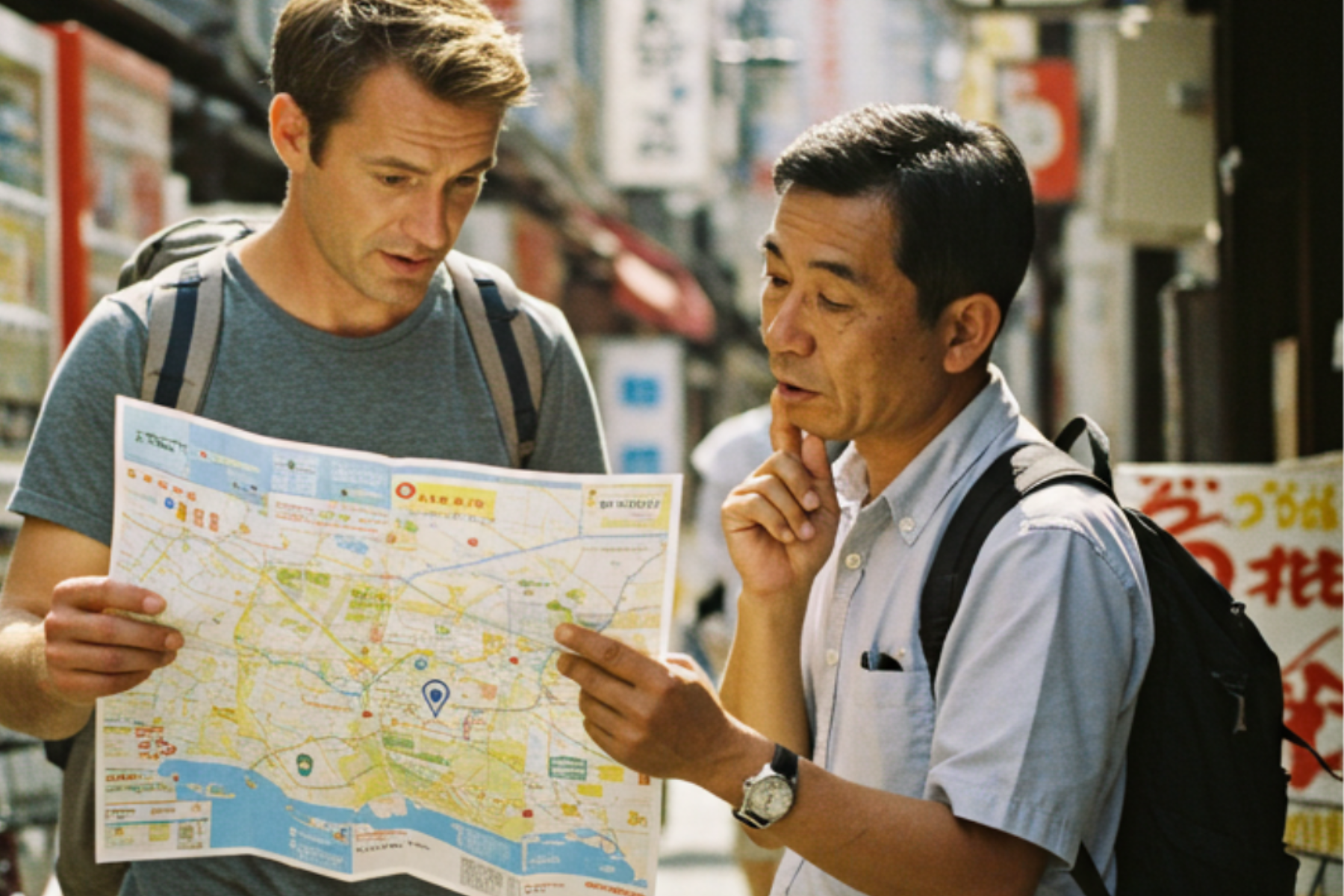Visiting Japan is an exciting experience, but if you don’t speak Japanese, it can feel a little intimidating. The good news is that you don’t need to be fluent to get around!
With just three simple Japanese phrases, you’ll be able to navigate restaurants, ask for directions, and show appreciation—making your trip smoother and more enjoyable.
Let’s dive into these essential phrases and learn how to use them effectively.
Sumimasen (すみません)
If you learn only one Japanese phrase before your trip, “Sumimasen” should be the one!
This versatile word can be used in multiple situations, including getting attention, apologizing, and even expressing gratitude.
How to Use “Sumimasen”
- To get someone’s attention (e.g., calling a waiter in a restaurant):
- To apologize for bumping into someone:
“Sumimasen” (I’m sorry.) - To ask for help politely:
“Sumimasen, eki wa doko desu ka?” (Excuse me, where is the train station?) - To express gratitude in casual situations:
“Sumimasen” (Thank you—when someone does something for you unexpectedly.)
When Not to Use “Sumimasen”
While “Sumimasen” can sometimes be used to thank someone, if you already know the Japanese word for “thank you”(Arigatou gozaimasu), it’s better to use that instead. This makes your appreciation clearer and more direct.
Example Scenario: You enter a restaurant and want to call the waiter to order food. Instead of waving or raising your voice, simply say “Sumimasen” in a polite tone, and the waiter will come to assist you.
[Place] wa doko desu ka? (〜はどこですか?)
Japan has an amazing public transportation system, but sometimes you’ll need to ask for directions. This phrase will be your best friend when trying to find a place.
How to Use “Wa doko desu ka?”
The structure is simple:
[Place] + wa doko desu ka? → (Where is [Place]?)
Here are some practical examples:
- Toilet wa doko desu ka? (Where is the toilet?)
- Eki wa doko desu ka? (Where is the train station?)
- ATM wa doko desu ka? (Where is the ATM?)
- Konbini wa doko desu ka? (Where is the convenience store?)
Tips for Using This Phrase Effectively
- If you don’t know the Japanese word for a place, saying it in English is usually okay.C
For example, “Station wa doko desu ka?” will likely be understood. - If possible, have a map or a translation app on your phone to help the person give directions more easily.
- Most Japanese people are kind and willing to help, so don’t hesitate to ask!
Example Scenario: You’re walking around a busy city and need to find a restroom. Simply approach a local, smile, and ask “Toilet wa doko desu ka?” while pointing at a map or gesturing. They’ll likely point you in the right direction!
Arigatou gozaimasu (ありがとうございます)
Politeness is highly valued in Japanese culture, and knowing how to say “thank you” properly will leave a good impression on the locals.
How to Use “Arigatou gozaimasu”
- To thank someone formally (e.g., when a shopkeeper gives you change):
- To show appreciation when receiving help:
“Arigatou gozaimasu.” (Thank you—when someone helps you with directions.) - To express gratitude casually (with friends or younger people):
“Arigatou.” (Thanks.)
When to Use the Formal or Casual Version
- Use “Arigatou gozaimasu” in formal situations (e.g., in stores, restaurants, with strangers).
- Use “Arigatou” in casual settings (e.g., with friends, younger people).
Example Scenario: You buy a souvenir from a shop, and the shopkeeper hands you your receipt and bag. Smile and say “Arigatou gozaimasu”, and they will appreciate your politeness!
Putting It All Together
Now that you know these three essential phrases, let’s imagine a real-life scenario where you can use them all in one interaction.
Scenario: Shopping in Japan
- You enter a store and want to ask a staff member for help.
“Sumimasen!” (Excuse me!) - You need to find the restroom, so you ask:
“Toilet wa doko desu ka?” (Where is the toilet?) - After using the restroom, you buy a small item at the store.
The cashier hands you your change, and you say: “Arigatou gozaimasu!” (Thank you very much!)
With just these three phrases, you can confidently interact with locals, ask for help, show gratitude, and navigate Japan with ease!
Why These Three Phrases Are So Useful
Even if you don’t know much Japanese, learning just these three phrases will significantly enhance your travel experience. They cover a wide range of situations, from ordering food to asking for directions and expressing gratitude.
Plus, using Japanese words—even simple ones—shows respect for the local culture, and locals will appreciate your effort.
- “Sumimasen” – For getting attention, apologizing, and even thanking.
- “Wa doko desu ka?” – To ask where something is.
- “Arigatou gozaimasu” – To express gratitude politely.
Next time you visit Japan, try using these phrases in real-life situations. You’ll feel more confident, and your interactions with locals will be much smoother.
Safe travels, and enjoy your time in Japan!

